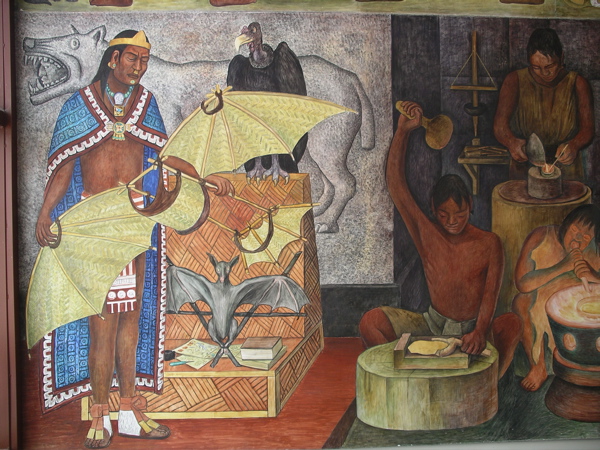 Soc 338: The Indigenous Experience in the Americas Winter
2009
Instructor: Dr. Gonzalo F. Santos Class: 12:20 pm - 2:25 pm, Tue. & Th., Room: BDC 264 |
| Dr.
Santos' Office:
DDH-AA205 Office Hours: 9:00 am - 10:00 am MWF Phone: 664-2191 |
| Teaching Assistant: Ms. Nancy Duran T.A. Office: DDH-AA204 T.A. Office Hours: By appointment only |
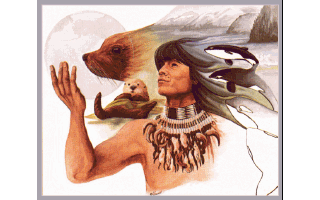 Textbooks:
Textbooks:
- David E. Wilkins, 2006. American Indian Politics and the American Political System. 2nd. Edition. New York: Rowman & Littlefield Publishers, Inc.. ISBN: 978-0742553460.
- Courtney Jung, 2008. The Moral Force of Indigenous Politics: Critical Liberalism and the Zapatistas. Cambridge: Cambridge University Press. ISBN: 978-0521703475
- Benjamin Dangl, 2007. The Price of Fire: Resource Wars and Social Movements in Bolivia. Oakland: AK Press. ISBN: 978-1904859338.
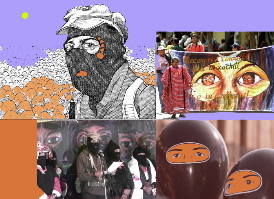 Course
Content:
Course
Content:
This course explores the social, cultural,
economic and political experiences of modern indigenous peoples in the
United States and in
two countries of Latin
America: Mexico and Bolivia. We first focus on the rich and complex
Native American
experiences in the United States over the course of the XX Century,
with emphasis on the tremendous social
rebellions of the 1930s and 1960s and the state policies and programs
that prompted and responded to them, leading to the substantial, though
incomplete, recovery of Native American sovereignty, a reinvigorated
indigenous identity and culture, and a mixed reality today. We
then analyze the resurgence of indigenous-led national liberation
movements in Mexico and Bolivia - the Zapatistas in Mexico and the MAS
(Movement Towards Socialism) in Bolivia - each resulting from distinct
national histories of tried and failed models of nationhood and
development; both emerging in the post-Cold War era as dramatic
alternatives to capitalist globalization and its neoliberal ideology;
both re-asserting, via entirely different strategies, the centrality of
indigenous peoples in the present and future of Latin America.
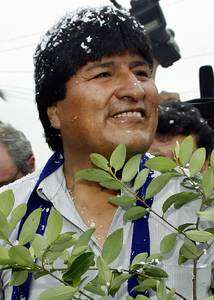 Course Structure:
Course Structure:
The course will be run as a
"semi-seminar": Students will take turns introducing the assigned
readings in each class session, followed by Dr. Santos lecturing and
leading the discussion. If there are two assignments, we'll have a
short break and repeat the process with a different student. Attendance
is, of course, mandatory, and all students must come prepared to
discuss
the readings.
Besides the classroom activities, students will produce two research
papers on a relevant sociological topic related to the course: the
first one on present-day U.S. Native Americans and the second one on an
indigenous people, issue, or movement in present-day Latin America.
Class
Presentations: On a rotational basis, for most of the
classes a group of 3 students will introduce and summarize each of the
assigned
readings. If you wish to do a PowerPoint presentation that is fine,
just please bring your presentation in a
USB-type memory stick in format "ppt" (NOT "pptx"). When it's your turn
to present, please show up early to set it
up & test it. Or, if you prefer, you may bring a printed outline of
your presentation and distribute copies to the class. Students will
present twice for this class.
The presentations will be evaluated based on: (a) the descriptive and
analytical strength
of the summary, (b) critical thinking,
(c) the relevance and quality of the question posed
at the end, and (d) the quality of the oral presentation
(including the visuals displayed).
Reading Assessments: To ensure that everybody come to every
class prepared to discuss the assigned readings, students who are not
presenting must bring to class a written "reading assessment" per
reading (chapter) assigned, each up to two pages in length,
double-spaced text. The reading assessments must be turned in
to Dr. Santos at the
beginning of each class session. No late reading assessments will be
accepted, unless the student has a pre-authorized absence from Dr.
Santos. DO NOT SEND YOUR READING ASSESSMENTS BY EMAIL.
Reading assessment content: Please always write on top of your
reading assessments your name, the date, and the reading you are
assessing. In contrast to the
presentations, these
"reading assessments" must not
summarize or describe the readings, but must critically respond to them: express what the you think about them; identify the
areas of strong agreement and
disagreement with the author, explaining why, as well as
identify the areas or topics you find most
interesting to discuss, or anything in particular that impressed you
greatly, caused you serious confusion, or surprise. Whatever you write,
you
should explain your specific academic and/or personal reasons for doing
so. The reading assessment cannot and should not cover every issue
found in the assigned
readings for the day; you must be selective and demonstrate judgment
in the choices you make to discuss (by the way, early topics are always
suspect!). A very bad assessment will reveal the student read very
little or very superficially just to do the assignment (it's called
"going through the motion"). A good assessment will demonstrate the
student really read the material and did a serious effort to select and
critically grapple with some of the main issues raised. At the end of
each reading assessment, students should always write their own
question for class discussion.
Note: Students
presenting on a given day do not need to submit any reading assessment.
Research Papers: Students
will also be asked to chose two
pertinent historical/sociological topics relating to the contemporary
indigenous
experiences in the United States and Latin America, and do papers on
each, respectively. The
first paper is due on February 19 in class, and the second paper is due
by noon on March 19 in Dr. Santos' office. The students must obtain
approval from
Dr. Santos for their paper topics. You may visit Dr. Santos at his
office during his office hours
posted above.
All papers must be delivered in printed paper and also emailed to Dr. Santos in Word format (".doc" - NOT ".docx").
Extra Points: Perfect attendance will be rewarded with extra points. Another way to get extra credit is to attend those campus or public events Dr. Santos announces in class and write a two-page report on each of them. Yet another way is this: there are two general studies courses that students are strongly encouraged to take if they wish to develop their research skills, and if they do (either or both) will receive extra credit in this course: These courses will enable students to develop the necessary competencies to navigate their way around the complexities of researching print and electronic sources. For further information contact librarian Christy Gavin (email: <cgavin@csub.edu>, phone: 661-664-3237).
Introduces students to effective research techniques using Library electronic resources. Emphasis will be placed upon skills necessary for the identification, retrieval, and evaluation of information for general and specific topics. Students will acquire the competencies necessary to develop an effective search strategy and find research materials, including references to journal articles, full text articles in electronic format, government publications, books, and Internet resources.
GST 153 - Research on the Internet (2 units)
Introduces students to the information resources available on the Internet for research purposes Students will develop general knowledge of the Internet, navigation skills, effective search strategy skills, familiarity with Internet finding tools, evaluation methodologies and other Internet research skills.
______________________________________________________________
Plagiarism:
To
prevent students from wittingly or unwittingly engaging in plagiarism,
Dr. Santos strongly recommends students to carefully read and abide by
the document CSUB
Classifications of Plagiarism found at: http://www.csub.edu/tlc/options/resources/plagiarism/4plagiarimclassifications.htm.
Grading: The class presentations are worth 10
points each (20
points total). The research papers are worth up to 20 points each (40
total).
The reading assessments are worth the remaining 40 points. The
extra credit students may
receive for
taking the suggested General Studies courses will depend on their final
grade in those courses, and may range from zero to 6 points (up to 3
extra points
per course). Perfect attendance will also be rewarded with 5 extra
points; absences and tardiness/leaving early will be penalized with one
point off per instance. The final
letter grade will be assigned, on a scale of 0 to 100, as follows:
| 94-100 = A | 87-89 = B+ | 77-79 = C+ | 65-69 = D |
| 90-93 = A- | 84-86 = B | 74-76 = C | < 65 = F |
| 80-83 = B- | 70-73 = C- |
Office Hours & E-Mail to Dr. Santos & Ms. Nancy Duran
Dr. Santos will generally be available at his office, DDH-AA205, from 9:00 to 10:00 am, MWF. Students are encouraged to come see him or to call him (664-2191) during these times. Please be advised, though, given the large volume of email he receives, that email communication has to be very brief and to the point. Expect an equally brief answer. Clearly identify your business in the subject heading, and make sure to sign off with your full name.
The T.A., Ms. Nancy Duran, will be available to tutor or meet with you by appointment only, at her office, DDH-AA204. She will be in charge of evaluating the email reports and handling email traffic. You may contact her by email at her address above. Again, be brief and to the point, and expect a brief reply, too. If you wish to set up an appointment, you should leave her a phone number where she can reach you - and always sign off with your full name.
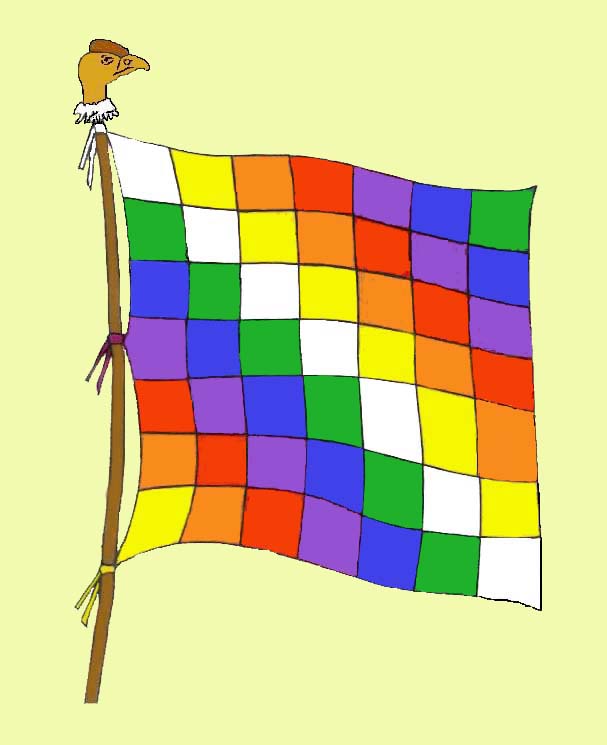 Schedule
of Assigned
Readings
Schedule
of Assigned
Readings 
|
|
|
|
| January
8 |
Introduction to the class | |
| 1
|
Introduction Presenter: Dr. Santos 1. A Tour of Indian Peoples and Indian Lands Presenter: Dr. Santos |
2. Indian Peoples Are Nations, Not Minorities Presenter: Dr. Santos |
| 2
|
3. Actors in Indian Politics Group: ______1_______ |
4. A History of Federal Indian Policy Group: ______2_______ |
| 3
|
5. Indigenous Governments: Past, Present, and Future Group: ______3_______ |
6. Tribal Political Economy Group: ______4_______ |
| 4
|
Wilkins 7. Indian Political Participation Group: ______5_______ 8. Indian Interest Group Activity and Activism Group: ______6_______ |
Wilkins 9. Indians, Images, and the Media Group: ______7_______ 10. Indigenous Nations and the American Political System Group: ______8______ |
| 5
|
Jung Introduction Presenter: Dr Santos 1. Stepping behind the claims of culture: constructing identities, constituting politics Presenter: Dr Santos |
Jung 2. Internal colonialism in Mexican state formation Group: ______9_______ |
| 6
|
Jung 3. The politics of small things Group: ______10_______ |
First research paper due
in class Jung 4. From peasant to indigenous: shifting the parameters of politics Presenter: Dr. Santos |
| 7
|
Jung 5. The politics of indigenous rights Group: ______11______ |
Jung 6. Critical liberalism Group: _____1________ |
| 8
|
Dangl 1. Revolution in Reverse Group: ______2_______ 2. More Than a Leaf: Coca & Conflict in Bolivia Group: ______3_______ |
Dangl 3. Water War in Cochabamba: A Victory Against Fear Group: _____4________ 4. IMF Backlash: ¡Que Se Vayan Todos! Group: ______5_______ |
| 9
|
Dangl 5. Occupy, Resist, Produce Group: ______6_______ 6. The Weather Underground Group: ______7_______ |
Dangl 7. El Alto: The City That Contains the Nation Group: _____8________ 8. Paradise Now: Street Theater, Hip-hop, and Women Creating Group: _____9________ |
| 10
|
9. Continent on a Tightrope Group: ______10_______ 10. Bolivian Moment: The Morales Administration Group: ______11_______ |
Second Research Paper due by noon on Thursday, March 19 at Dr. Santos' office |